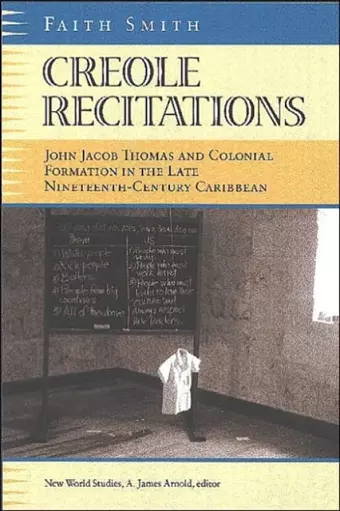Creole Recitations
John Jacob Thomas and Colonial Formation in the Late Nineteenth-century Caribbean
Format:Paperback
Publisher:University of Virginia Press
Published:31st Dec '02
Currently unavailable, our supplier has not provided us a restock date

John Jacob Thomas (1841-1889) was one of the leading members of a newly emergent intelligentsia in nineteenth-century Trinidad - a group that could be identified as both ""Victorian"" and ""Pan-Africanist"" - who not only challenged British imperialist accounts of Trinidad but also tried to show the interconnections, bloodlines, and origins of ""Caribbean"" and ""English"" identities usually perceived as separate and distinct. As a member of that emerging black lower middle class, Thomas was well known for his 1869 study of Trinidad's Creole language, as well as for Froudacity (1889), his pointed and witty response to the travel narrative of the Victorian James Anthony Froude, an early example of ""writing back to empire."" Responding to Trinidad's transformation by significant migrations from the eastern Caribbean, West Africa, and the Indian subcontinent, he sought to ""tame"" the working-class energies that radicalized his work and to bring them in line with ""modern"" conceptions of the nation. As a defender of francophone cultural production in a British colony, though a loyal subject of Queen Victoria, and as a pan-Africanist whose commitments were simultaneously diasporic and local, Thomas complicates current discussions of colonial and postcolonial intellectuals, Black Atlantic paradigms, and Victorian intellectual life. In Creole Recitations, the first full-length study of Thomas, Faith Smith puts his texts in dialogue with other narratives by local and international Pan-Africanists, Victorian intellectuals, and local and regional blacks, coloreds, and whites. Shedding light on the intellectual terrain of the late nineteenth century, she provides an important context for better-known figures of twentieth-century Caribbean literature such as C. L. R. James, V. S. Naipaul, and Jamaica Kincaid.
The kind of intellectual biography/history that Smith provides - with scrupulous attention paid to earlier colonial history in addition to postcolonial politics - is rare in the canonical fields, let alone in the more recent domain of black studies. This work will create strong ripples in Caribbean studies, some of them usefully controversial. It will certainly change the face of the Caribbean intellectual tradition and will introduce Professor Smith as a leading name in the field. - Supriya Nair, Tulane University, author of Caliban's Curse: George Lamming and the Revisioning of History
ISBN: 9780813921433
Dimensions: unknown
Weight: 369g
224 pages